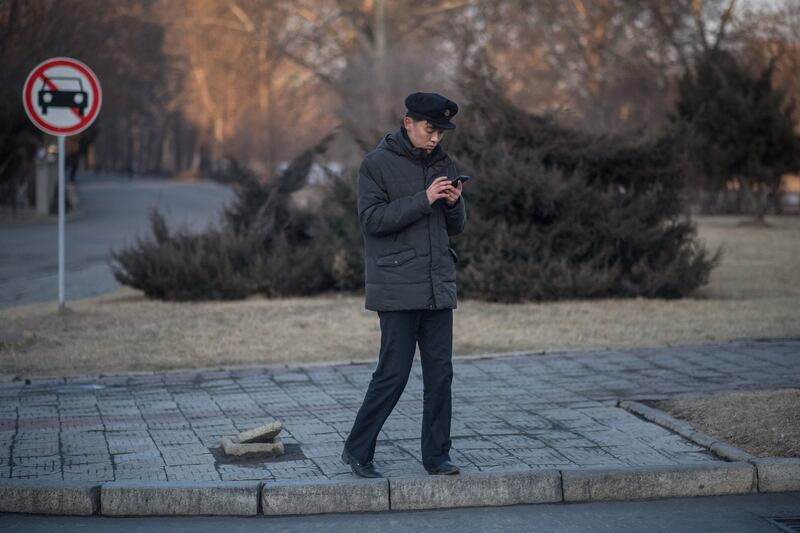North Koreans walking around in public holding their cell phones are getting in trouble with the police, residents there told Radio Free Asia.
But it isn’t clear if it's an effort to guard state secrets, as the government claims, or simply an excuse for police to shake down people for bribes. Or both.
North Korea introduced the State Secrets Protection Law in February to prevent photos and videos – especially those of propaganda lecture materials – from finding their way out of the country.
The country remains blocked off from the global internet, making it hard for most people to send any kind of information outside the country through their phones.
But people living along the border with China do sometimes use smuggled Chinese phones to access the Chinese cellular network, and can transmit photos and videos that way.
Now it appears that authorities are trying to stop people from taking any photos that would reveal anything at all about life in the isolated country.
Police in plain clothes patrol the marketplaces and stop people walking around with their cellphones in their hands, a resident of South Pyongan province, north of the capital Pyongyang, told RFA Korean on condition of anonymity for security reasons.
“Recently, when police see people walking around in the marketplace with cell phones in their hands, they stop them and check their phones,” he said, adding that it isn’t possible to know how many police are observing a particular location, since they are not wearing uniforms.
Excuse for extortion?
Previously, when police would stop to check people’s electronic devices, the goal was to find contraband media, such as TV shows or movies from South Korea. But now they are simply looking for pictures, the resident said.
“The crackdowns on cell phones involve searching for photos and videos of the marketplace among the photos in the phone,” he said.

If such a photo were to be found, there is a possibility that the phone owner could be accused of spying and trying to sell secret information to South Korea, and imprisoned.
“As the police randomly crack down on cell phones, market merchants say it is a tactic to extort money ahead of the end of the year,” he said.
Police are more privileged than the civilian population, but just like the average citizen, the salary from their government-assigned job is nowhere near enough to make a living. Most families must run side businesses selling goods or services in the local market to support themselves.
Police, however, can catch people doing questionable or illegal activities and accept a bribe to look the other way. So it is possible that the increased scrutiny is a way to collect some cash before year-end, the residents said.
In the city of Sinuiju, on the border with China in North Pyongan province, police have been on the lookout for phones near the train station and at the marketplace all December, a resident there told RFA on condition of anonymity to speak freely.
“Residents who were caught [with their phones] say it is ridiculous because the police said … they want to check whether they are taking pictures of their surroundings,” he said.
“The police threaten them, saying that preventing people from taking ‘internal photos’ with cell phones … is merely upholding the State Secrets Protection Law.”
But many people aren’t buying the police officers’ explanations, the North Pyongan resident said.
“[They say] authorities are creating anxiety by cracking down on cell phone owners as leakers of national secrets,” he said. “But the scenes around the market and the station are not national secrets.”
Translated by Leejin J. Chung. Edited by Eugene Whong and Malcolm Foster.
